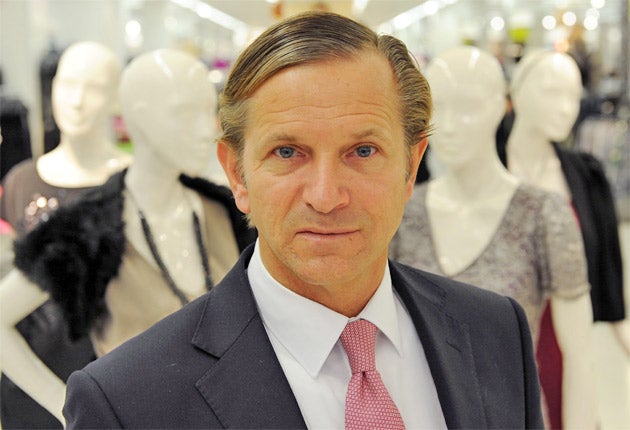Shares at Marks & Spencer rally on signs of improvements despite 13th consecutive fall in clothes sales
The shares soared nearly 8%, despite the retailer recording a 13th consecutive quarterly fall in sales at its clothing division

Your support helps us to tell the story
From reproductive rights to climate change to Big Tech, The Independent is on the ground when the story is developing. Whether it's investigating the financials of Elon Musk's pro-Trump PAC or producing our latest documentary, 'The A Word', which shines a light on the American women fighting for reproductive rights, we know how important it is to parse out the facts from the messaging.
At such a critical moment in US history, we need reporters on the ground. Your donation allows us to keep sending journalists to speak to both sides of the story.
The Independent is trusted by Americans across the entire political spectrum. And unlike many other quality news outlets, we choose not to lock Americans out of our reporting and analysis with paywalls. We believe quality journalism should be available to everyone, paid for by those who can afford it.
Your support makes all the difference.Marks & Spencer boss Marc Bolland has bought himself more time as the struggling High Street titan begins showing signs of improvement in its much-maligned womenswear division.
The shares soared nearly 8 per cent, despite the retailer recording a 13th consecutive quarterly fall in sales at its general merchandise business, which includes clothing, as investors appeared impressed with profits remaining steady and costs tightening.
Bolland revealed that, during the five months to the end of August, sales in its under-pressure womenswear division rose 1.3 per cent.
However, the Indian summer, which saw one of the hottest and driest Septembers on record, meant general merchandise fell 4 per cent on a like-for-like basis for the three months to the end of that month. It was down 2.9 per cent over the six months.
He also warned October was only marginally better, as the warm weather left several lines unsold.
Gross margins, the difference between the wholesale and retail prices, in general merchandise improved by 150 basis points over the first half, and Bolland also raised its non-food gross-margin forecast for the full-year to growth of between 150 and 200 basis points, up from 100 basis points.
Half-year pre-tax profits fell 0.4 per cent to £279.4 million, which was one of the smallest profit drops since Bolland’s tenure, while underlying profits jumped 2.3 per cent to £267.6 million, better than City analysts were expecting.
There was also a hike in the interim dividend, which rises 0.2p to 6.4p, as investors pushed the shares up 31.5p to 436.2p.
Bolland said the boost in profits was mainly down to cost cutting in its supply chain.
M&S’s discount policy has come under attack, with customers becoming frustrated after buying garments at full price only to see it discounted a few weeks later.
Last Christmas loyal customers complained when he launched a 20 per cent off everything sale weeks before Christmas Day. Bolland refused to rule out a similar sale this year and said any promotions would depend on “remaining competitive”.
He added: “There are some things you cannot completely plan for. We have slightly higher stock but we will be able to trade it well this week as we see the weather changing.”
However, there were also troubling signs on the website, which saw sales down 6.3 per cent after a £150 million overhaul led to its entire customer base being forced to re-register.
Bolland predicted website sales would return to growth in the next few weeks and said customer complaints about how complicated the website had become were being addressed.
Join our commenting forum
Join thought-provoking conversations, follow other Independent readers and see their replies
Comments